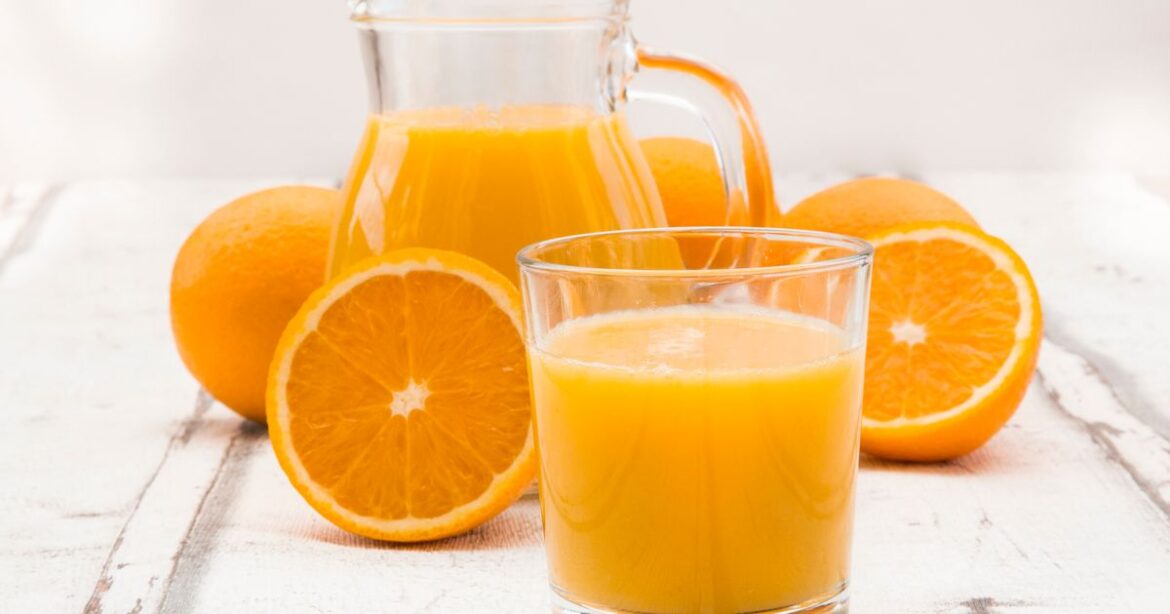Table of Contents
A glass to wash down your pancakes and bacon, a cup when you’re getting the sniffles: For many households in the United States, orange juice is part of the morning routine. Sure, it has vitamin C, potassium and folate, but it’s also packed with sugar and citric acid, which has started to earn it a bad reputation.
While OJ has long been seen as a health drink, should this breakfast table staple be a thing of the past? We talked to a variety of health and nutrition experts about the effects of OJ on your body and how to best consume it.
How healthy is orange juice for you, from a nutrition standpoint?
The good-ish news is that you’re probably consuming other foods that are far less healthy than a glass of orange juice. But it’s not a superfood, by any means.
“I wouldn’t say orange juice is bad for the body. It’s a source of essential nutrients,” said Heidi McIndoo, a registered dietitian. “However, like most things, when consumed in large quantities, it can lead to unhealthy results.”
But it’s important to pay attention to what’s on the label, McIndoo said.
“If a person is interested in the nutritional benefits of a juice, seeing ‘all-natural’ on the label is meaningless,” she said. “If, however, a person is looking to avoid any artificial ingredients, that claim can help them make their food choices.”
But is it a healthy drink?
Most experts would steer you away from the juice aisle.
“While many people consider orange juice to be a health drink, I advise those who want to lose weight and lower their blood sugar to stay away,” said Maggie Bell, a registered dietitian.
And while the “no added sugar” label may be accurate, there’s a lot of natural sugar in your OJ. The USDA says an 8-ounce serving of orange juice contains roughly 20 grams of sugar, equivalent to nearly 5 teaspoons.
She also flags that the addictive nature of sugar often leads to overconsumption, potentially contributing to weight gain over time.
Westend61 via Getty Images
While we’re on the topic of weight gain …
Given the massive sugar hit orange juice offers, it’s no surprise that it can add to weight gain.
“If you have a goal to not just drop some weight but also maintain it healthily long-term, drinking orange juice can be one of many sneaky culprits that are sabotaging your progress,” said Rich Taylor-Wellington, a fitness performance coach.
He cites the process of removing the fibrous parts of the orange to make orange juice as one of the main reasons he’s not a fan.
“That’s responsible for the speed at which we eat the orange and also helps us produce certain digestive enzymes when we chew,” Taylor-Wellington said. “Without the fleshy part of the fruit, we can guzzle two to three oranges worth of juice in seconds.”
It’s not the best option for your teeth, either
Citrus fruits have long been known to contain citric acid, which wears away at our enamel, and orange juice is no different.
“Orange juice is a double whammy on teeth: It has a high sugar content and is acidic,” said Elizabeth V. Simpson, a general dentist, faculty member at Indiana University School of Dentistry and chair of the American Dental Association’s Council on Advocacy for Access and Prevention.
“The longer patients drink acidic beverages, the worse the effects,” she said. “If you consume a lot of things that break down into sugar like orange juice, you have a high likelihood of damaging your teeth and needing dental treatment.”
But there is a silver lining for people with diabetes.
When high amounts of sugar are involved, people with diabetes should take note. But one expert said that when it’s consumed correctly, orange juice doesn’t have to spike blood sugar to unhealthy levels.
“Research shows no link between 100% fruit juice intake and increased diabetes risk in adults,” said Vandana Sheth, a registered dietitian and diabetes care and education specialist.
She specifies that each diabetes patient is different and should speak to a doctor about individual needs.
“Blood sugar response to food and drinks is individualized and unique,” Sheth said. “Drinking orange juice alone may raise your blood sugar quickly. However, pairing it with fiber and protein can mitigate this risk.”
So what’s the best way to get your orange hit?
Simply put: Eat it, don’t drink it.
Both McIndoo and Taylor-Wellington agree that an orange’s fiber will help you feel fuller, so instead of consuming multiple oranges found in a glass of OJ, you’ll likely just eat one.
And if you simply must drink it, do it in moderation and track your intake so you don’t go overboard. When it comes to protecting your teeth, Simpson recommends drinking it with a straw, minimizing contact with your enamel and cultivating a taste for water instead.


